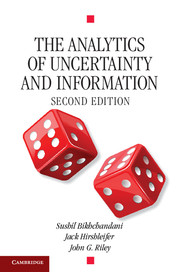Book contents
- Frontmatter
- Contents
- Acknowledgments
- In Memoriam
- Introduction
- Part I
- Part II
- 5 Information and Informational Decisions
- 6 Information and Markets
- 7 Strategic Uncertainty and Equilibrium Concepts
- 8 Informational Asymmetry and Contract Design
- 9 Competition and Hidden Knowledge
- 10 Market Institutions
- 11 Long-Run Relationships and the Credibility of Threats and Promises
- 12 Information Transmission, Acquisition, and Aggregation
- Index
- References
7 - Strategic Uncertainty and Equilibrium Concepts
Published online by Cambridge University Press: 05 August 2013
- Frontmatter
- Contents
- Acknowledgments
- In Memoriam
- Introduction
- Part I
- Part II
- 5 Information and Informational Decisions
- 6 Information and Markets
- 7 Strategic Uncertainty and Equilibrium Concepts
- 8 Informational Asymmetry and Contract Design
- 9 Competition and Hidden Knowledge
- 10 Market Institutions
- 11 Long-Run Relationships and the Credibility of Threats and Promises
- 12 Information Transmission, Acquisition, and Aggregation
- Index
- References
Summary
For the most part, the analysis to this point has dealt with event uncertainty. Individuals were mainly uncertain about nature's choice of state of the world. In the following chapters the focus shifts to strategic uncertainty, where the best course of action for individual A depends upon individual B's choice, and vice versa. So the main risks that a person has to deal with concern the actions and reactions of others. A first step is the choice of an equilibrium concept for such an environment, which turns out to be a subtle and still controversial issue. As usual, our discussion will not attempt to address formal issues of existence or uniqueness of equilibrium. Our aim instead is to provide an intuitive interpretation of the key ideas.
Dominant Strategy
We begin with the Prisoners’ Dilemma, a game that is easy to analyze. The story behind this game is as follows. Two accomplices have been arrested on suspicion of committing a major crime. The prosecutor does not have sufficient evidence to convict them of this crime. Without a confession from at least one of the two accomplices the prosecutor can only send them to prison for one year for the lesser charge of illegal possession of weapons. The two accomplices (or prisoners) are locked up in different cells and cannot communicate with each other. The prosecutor approaches each of them separately and says, “If you confess and your friend does not then I will drop all charges against you. On the other hand, if your friend confesses and you do not then you will do 10 years. If you both confess then I’ll see to it that you get parole after 5 years in prison. Think hard about what you want to do and let me know tomorrow morning.”
- Type
- Chapter
- Information
- The Analytics of Uncertainty and Information , pp. 270 - 307Publisher: Cambridge University PressPrint publication year: 2013

